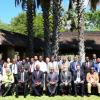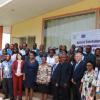News
Displaying Results 26 - 50 of 341
Making drinking water and sanitation services affordable for all is key to guaranteeing the human rights to drinking water and sanitation. In the human rights framework, water and sanitation services are unaffordable when paying for them would compromise the ability to pay for other essential needs…
While the COVID-19 pandemic has highlighted the extent to which water, sanitation and hygiene are key to human health through frequent handwashing, in the UNECE region over 16 million people still lack access to drinking water and more than 31 million are currently living without basic…
Cameroon shares most of its water resources - such as Lake Chad, the Congo, Sanaga and Niger rivers - with other states. Cooperation on these shared waters is therefore essential to ensure economic development and preserve regional stability.As a result, Cameroon is also a heavily involved in…
Water quality is a serious problem in Central Asia, but until now there was no formal cooperation between the countries in the region. A new regional working group on water quality, established under the project “Strengthening cooperation on water quality management in Central Asia” funded by…
The Niger River Basin, shared by Benin, Burkina Faso, Cameroon, Côte d’Ivoire, Guinea, Mali, Niger, Nigeria and Chad, is the second largest river Basin in West Africa and home to 140 million people. With increasing demands on its water resources, ensuring cooperation for their management is…
40 percent of the world’s population lives in one of the 275 transboundary river basins. Transboundary waters account for 60 percent of the world’s freshwater flows. Cooperation for the management of shared water resources is therefore crucial for economic development, peace and environmental…
40 percent of the world’s population lives in one of the 275 transboundary river basins. Transboundary waters account for 60 percent of the world’s freshwater flows. Cooperation for the management of shared water resources is therefore crucial for economic development, peace and environmental…
On 29 February 2024 Zambia declared a National Crisis and Emergency regarding a drought gripping the country and which has decimated food and energy supply. Other Southern African countries have declared similar National Emergencies due to severe drought, including Zimbabwe in April. Severe…
Approximately 40% of the world’s population live in transboundary river and lake basins, accounting for an estimated 60% of global freshwater flow. These shared water resources support the livelihoods of more than 3 billion people. In a world increasingly impacted by the effects of climate change,…
Burkina Faso is one of the Sahelian countries hardest hit by the effects of climate change, experiencing torrential rains and floods, as well as periods of insufficient rainfall.
To help address these challenges, through adaptation, resilience and concerted, shared management of its water…
Transboundary waters are a global common good crucial for human life, which require concerted management and protection. The ninth session of the Meeting of the Parties (MOP 9) to the Convention on the Protection and Use of Transboundary Watercourses and International Lakes (Water Convention) has…
Despite being a relatively water-rich country for the Middle East, water is an increasingly scarce resource in Lebanon. Transboundary cooperation for the sustainable management of its three transboundary watercourses — the Asi-Orontes, the Nahr al-Kabir and the Hasbani-Wazzani Rivers — as well…
Sierra Leone shares four major rivers with the neighbouring countries of Guinea and Liberia, including the Great Scarcies, Little Scarcies and Moa shared with Guinea, and Mano River shared with Liberia. All provide crucial freshwater that sustains ecosystems, livelihoods and the well-being of…
Institutional reform in the water sector in Armenia will reach a new milestone in 2017 with the enactment of provisions on drinking water. As a result, a single water service operator will be chosen to supply drinking water for the entire country, instead of the five separate companies operating…
Kazakh university professors took part in a course on political and technical aspects of integrated water resources management (IWRM) at the German-Kazakh University in Almaty from 15-26 August. This was the first part of training for academic staff from the largest Kazakh universities within…
The challenges posed by climate change to Central Asia, the likelihood of more frequent compound water-energy-food crises and the growing strain on the shared water resources of the region due to economic development and demographic growth require more intensive joint efforts by the countries of…
Growing water scarcity, climate variability and increasing water needs for economic development have led to a rising global interest in water allocation practices. Especially where rivers, lakes and groundwater bodies cross national borders, the competing demands of countries and sectors for…
UNECE has just launched a web portal to improve water management, to share knowledge about the state of water resources and to track progress in ensuring the sustainability of water resources across the region. The portal is the virtual face of the Astana Water Action (AWA), a toolkit of…
More than 40% of the world population relies on transboundary water resources. Cooperation on these resources is necessary to manage shared waters in an integrated and sustainable way. Such cooperation has the potential to generate many significant benefits for countries involved, such as…
How can regional and international cooperation be fostered in a region that faces unprecedented water scarcity? How can the benefits of this vital resource be shared to increase resilience to climate change?
The Third Baghdad International Water Conference titled "Water Scarcity, the Mesopotamian…
On June 23-24, 2016 Russian and Kazakh experts met in Astana to discuss the first results of assessments of transboundary rivers Ural and Kigac. Final results will be presented at the annual meeting of Russian-Kazakh Intergovernmental Commission on Joint Use and Protection of Transboundary…
Ensuring the effective management of water resources so that different needs – including for agriculture, industry, drinking water supplies, hydropower and the protection of ecosystems – can be met is complex at the national level. When water resources are shared with other countries, this can…
Water scarcity was a key element discussed at the high-level business forum organized by Nestlé and UNCTAD in Lausanne on 9 October. Participants in the “Creating Shared Value Global Forum” discussed the changing role of business in society and how governments and civil society can work with…
Much of Chad's water resources are shared, notably the Lake Chad basin and its many tributaries and distributaries (shared with Cameroon, Central African Republic, Libya, Niger, Nigeria, Sudan and Algeria), the Niger River basin (shared with Benin, Burkina Faso, Cameroon, Côte d'Ivoire, Guinea,…
Kazakhstan is heavily dependent on water in rivers shared with other countries, in most cases as the downstream neighbour in basins shared with China, the Russian Federation and other Central Asian States. Given that climate change is expected to lead to decreased access to water for Kazakhstan…








